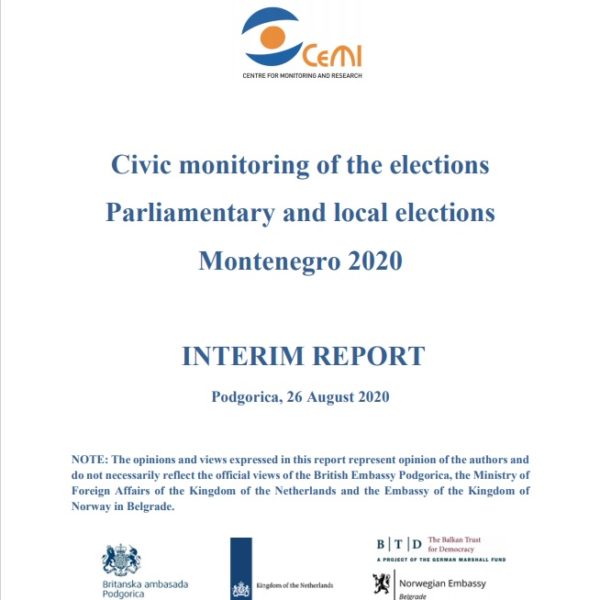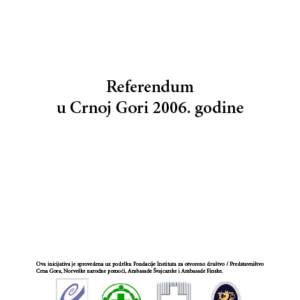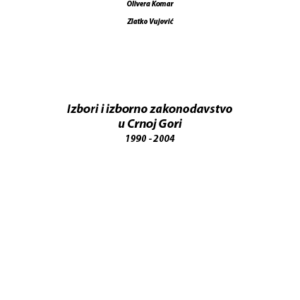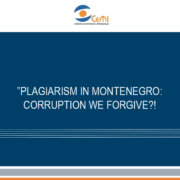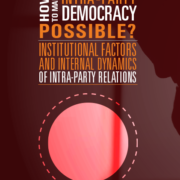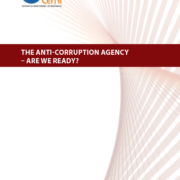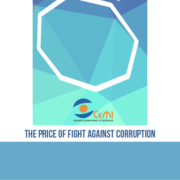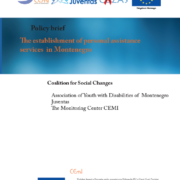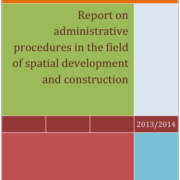Civic monitoring of the elections Parliamentary and local elections Montenegro 2020 – INTERIM REPORT –
Product Description
The legal framework for administration of elections has been partially amended despite the fact that the Law on Election of MPs and Councilors has not been amended due to unsuccessful electoral reform which could not obtain the support of two-thirds of the votes in the Montenegrin Parliament. The necessity to implement the law which regulates protection of people’s health, in relation to Covid-19 pandemic, caused higher level of ambiguities in relation to rules on administration of the electoral process, which adversely influence preparation of elections causing strong pressure in terms of legality and constitutionality in performance of the electoral administration, primarily the State Election Commission.
The State Election Commission (SEC) has mainly respected all legal deadlines for administration of electoral activities. The SEC has not demonstrated an adequate level of responsibility when adopting overall and clear recommendations for holding safe elections in terms of health protection. Adoption of regulations and documents which were abolished by the Constitutional Court as unconstitutional, is an indicator of insufficient competencies of SEC Members, as well of the political irresponsibility, since they consciously adopted unconstitutional regulations, as stated by the SEC PR Officer.
Abolition of certain provisions of the Technical recommendations caused postponement of certain activities which the Commission planned to implement. The SEC has not provided full transparency of its performance under the current election process, since the presence of media at SEC sessions and live broadcasting of SEC sessions via the internet have not been enabled which is the practice of many countries worldwide. Part of SEC that deserves compliments for the quality of the work performed is SEC Professional Service, that demonstrated a high level of professionalism and openness for cooperation with nongovernmental organizations. Municipal Election Commissions (MECs) have mainly performed their activities in compliance with the law.
Although there were some doubts in relation to selection of members of polling boards, the decisions made by MECs were in compliance with the law which was confirmed by the fact that five complaints about their work, which were lodged to SEC and one appeal which was filed to the Constitutional Court, were rejected.
A total of 1.217 polling boards (PBs) have been established which members shall be trained on administration of elections. The training for the polling board members is late due to above mentioned abolition of certain provisions of the Technical recommendations, which can cause an issue, especially in case of the pooling board chairpersons who are performing this function for the first time and under difficult circumstances caused by Covid-19. The Voter Register counts 540.026 voters which is 7.427 voters more than at the presidential elections held in 2018. Total number of polling stations has been increased by 4, so there are in total 1.217 polling stations. 6.288 voters who have old ID cards or passports (issued before 2008) and who did not submit requests for issuing new documents were entered into Voter Register, as well as 1.299 voters who do not have any valid identification document and did not submit requests for issuing new identification documents. The Ministry of Interior demonstrated a high level of readiness to cooperate with the representatives of the civil society sector by establishing the Expert team for monitoring the accuracy and up-to-dateness of the Voter Register.
The Ministry of Interior enabled citizens to check directly their status in the voter`s registry and get responses to their questions. Voter Register control will be performed at this electoral cycle, as well, by using AFIS system (automatic fingerprint identification system) in presence of local and international observers. Control has started on 25 August 2020 and it is still in progress. Public campaign and increased level of engagement of the competent services of the Ministry of Interior resulted in reduction of the number of voters without valid identification documents from more than 50.000 to 23.000 approximately as of the date when the voter register was finalized.
This issue was definitely solved by the SEC decision to allow the voters without valid identification documents to vote at the elections. The possibilities for misusing the citizens’ signatures while collecting signatures by the electoral lists, have remained many, as it was the case at previous election processes due to lack of the procedures for prevention. SEC decision in relation to the Socialists of Montenegro electoral list registration case, which was confirmed by the Constitutional Court has not been adequately elaborated and causes legal instability and creates grounds for discrimination of minorities.. Competent MECs did not indicate the necessity to modify the electoral lists because gender quotas were not respected in case of two electoral lists for the elections in Andrijevica and Budva which was the case of Law violation. If the provisions of the law on underrepresented sex are not respected, then the legislator’s idea behind adoption of this solution, which is encouraging women to participate more in the politics, becomes senseless.
Election campaign for the upcoming elections has been conducted under uncertain and irregular circumstances and conditions caused by non-compliance of the legal provisions which regulate the starting date and duration of the election campaign but also by lack of institutional rules and guidelines for conducting the election campaign under Covid-19 circumstances. The omnipresence of the “ public officials campaign”, i.e. intensive presence of high level public officials during the pre-election campaign is concerning. It refers primarily to promotions and commissioning of various structures and infrastructure projects by the President of Montenegro, Prime Minister and most of the Members of the Government of Montenegro, but also by the high officials in the local self-government bodies.
CeMI warns that it is related to direct violation of Article 50a of the Law on Election of MPs and Councilors and endangering the principle of equality of all electoral process contestants. Also, a clear institutional advantage of the ruling coalition is being created, while, regulated misdemeanor sanctions for the violations are not adequate and do not have deterrent effect. So far, the election campaign, dominantly conditioned by the regulations of the National Coordination Body for Communicable Diseases (NCB) in relation to the epidemiological situation, is of lower intensity than the previous electoral cycles, without many public gatherings organized. The greatest part of the campaign, especially in July, was conducted online and it was mainly focused on the YouTube channel and social networks. Later on, the campaign was intensified and political entities were using almost all techniques for promotion of their pre-election programmes: audio and visual advertising, billboards, dissemination of campaign material, contacting the voters in the field and through door-to door campaigns. As the campaign continues, elements of the negative campaign become more visible.
In the second part of the campaign, the Serbian Orthodox Church, despite initial announcement that it would not interfere into the pre-election campaign, has become its active participant justifying such position with the need to fight for cancelation of the Law on Freedom of Religion.
Organization of the Church’s protest walks was restarted by the active engagement of the Serbian Orthodox Church, even though they are organized illegally. Engagement of the Serbian Orthodox Church raises questions related to financing of the electoral campaign where financing by the religious communities is forbidden. This is a very sensitive issue and shall be treated by the Agency for the Prevention of Corruption (APC). For the 2020 Parliamentary Elections 11 electoral lists are confirmed, to which were distributed the budgetary assets amounting to €43,051,02 per electoral list before 12 August 2020, which was the deadline regulated by the law for distribution of 20% of the funds for electoral campaign costs. There are three confirmed electoral lists for the local elections in Andrijevica to which were distributed the budgetary assets amounting to €248,06 per electoral list before 12 August. There are seven electoral lists confirmed in Budva to which were distributed budgetary assets amounting to €1,730.88 per electoral list before the above mentioned date. During the same time period, there were six electoral lists which were confirmed for the local elections in Gusinje and distributed budgetary assets amounting to €90,31 per electoral list. For the local elections in Kotor, there were nine confirmed electoral lists to which were distributed budgetary assets amounting to €721,02 per list before 12 August.
There are seven electoral lists confirmed in Tivat to which were distributed budgetary assets amounting to €759,71 per electoral list before the legal deadline for distribution. Separate bank accounts for financing of the election campaign were opened by 11 political entities which are contestants to the parliamentary elections. The progress has been made compared to the previous parliamentary elections when several political entities did not fulfil this obligation. Ten political entities informed the APC about opening of the bank account within the deadline defined by the law Croatian Reform Party was the only political entity which fulfilled this obligation two days after the expiry of the legal deadline.
APC demonstrated readiness to cooperate with nongovernmental organizations through weekly working group meetings for monitoring of the campaign finance. With regards to the Amendments to the Law and due to special circumstances caused by the Covid19 pandemic, APC should pay more attention to performing control over the state bodies, business entities which owner and/or major or partial owner is the state, as well as to control in the area of social welfare transparency. The best example of the insufficient quality control performed by APC are some small municipalities (Andrijevica, Plužine) which have paid the largest amounts from budget reserves through single social welfare payments. Within the course of the campaign so far, there were 287 proceedings initiated against government bodies and 83 proceedings against political entities for violation of the provisions of the Law. The APC has performed the most of the controls envisaged by the Plan of control and supervision, but still, there have been no proceedings initiated in cases which attract the greatest public attention. The case has been formed by the Basic State Prosecution Office in Podgorica in order to determine all facts and circumstances related to the subject case which is currently in the preliminary proceedings phase. Besides that, the case of accusation of the vice president of the Assembly and political party Forca on behalf of coalition partners from the ruling structure to perform political corruption in Ulcinj by promising employments and employing people in order to secure votes is indicative.
The “umbrella” Law on Media and Law on RTCG was adopted by the Parliament of Montenegro in the end of July 2020 after the elections were called for.
Thus, the legal instability was created and there was not enough time left neither to the media nor to political entities to get familiar with the solutions which newly adopted Laws offer. Additionally, amendments to the Law on financing of political entities and election campaigns which were adopted by the Parliament half a year ago, which provisions regulate performance of media during election campaign, as well as APC competences in that regard, additionally contribute to instability and do not make a good indicator for uniform and equal treatment of all election entities. Montenegro has a diverse media environment. There are over 150 media at the market which include 22 TV stations, 53 radio stations, 70 information portals (registered electronic publications), 4 daily print outlets, 1 weekly print outlet and 1 news agency. Although being pluralistic, the media environment is deeply politically divided with easily noticeable political preferences in relation to published contents. The Parliament of Montenegro has not established the Committee for monitoring the enforcement of the Law on Election of MPs and Councilors with regards to media which was its legal duty.
The lack of numerous traditional debates in key talk shows is noticeable, both with the public broadcasters and private media. The conceptual design of the Television of Montenegro (TVCG) scenography which is almost identical to the pre-election campaign design of the ruling Democratic Party of Socialists (DPS) may be deceiving for the voters and falls under disguised media promotion which is contrary to Article 8 of the AEM Rulebook. This was a reason for numerous reactions of the representatives of other electoral lists and accusations of bias in informing on behalf of RTCG which were additionally deepened after the political video of the electoral list “Black on White” was banned because the hologram of the president of the state was used in the video. Agency for Electronic Media (AEM) is authorized to perform supervision over media during campaign.
The AEM has timely adopted the Rulebook on rights and duties of broadcasters during election campaigns. With regards to the situation related to coronavirus in Montenegro, social networks have played a significant role during the elections campaign.
A high level of the political parties’ activities were registered which has recorded a rising trend since June when the elections were officially called for. Political parties (DCG, DF, True Montenegro, SNP, DPS, URA, SD, SPD) have been dominantly active on social networks in the pre-election period, while minority parties were slightly less active. Having in mind that there is no legislative framework in Montenegro which explicitly regulates online media and social networks, it is important to mention the obligation to respect Facebook rules on political advertising for all political entities in Montenegro which has been enforced since 5 August 2020. With regards to that, the data on authorized advertiser or the author of the advertisement which are submitted to Facebook shall be available in Ad Library for the next 7 years. During the pre-election period, the most active media on the Facebook platform was FOS Media which has created and shared the largest portion of the uploaded content, followed by Portal Analitika, Portal Standard, Portal Antena M, Informativni portal IN4S, Kolektiv.me, Vijesti, and RTCG Portal.
Besides the high activity level of political parties and politicians on social networks, various web pages, groups and “mim” profiles have been used during the election campaign aimed at dissemination of messages by political parties and politicians to the voters. Participation of women at the electoral lists is slightly higher than in 2016. However, in the greatest percentage of cases (40%) women are still allocated at each fourth position on the electoral list which is the legal minimum. On the other hand, some irregularities were recorded when accepting two electoral lists at the local level, in relation to participation of underrepresented sex. Electoral lists “For future of Andrijevica” and “New Budva-Ilija Gigović” were not structured in compliance with the law which regulates that among each four candidates in the electoral list order there shall be at least one candidate who is a member of the underrepresented sex, which is direct violation of the Law on Election of MPs and Councilors.


 Montenegrin
Montenegrin